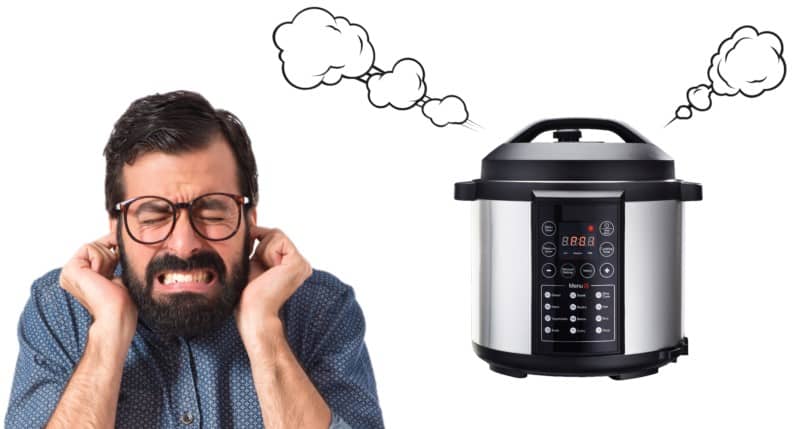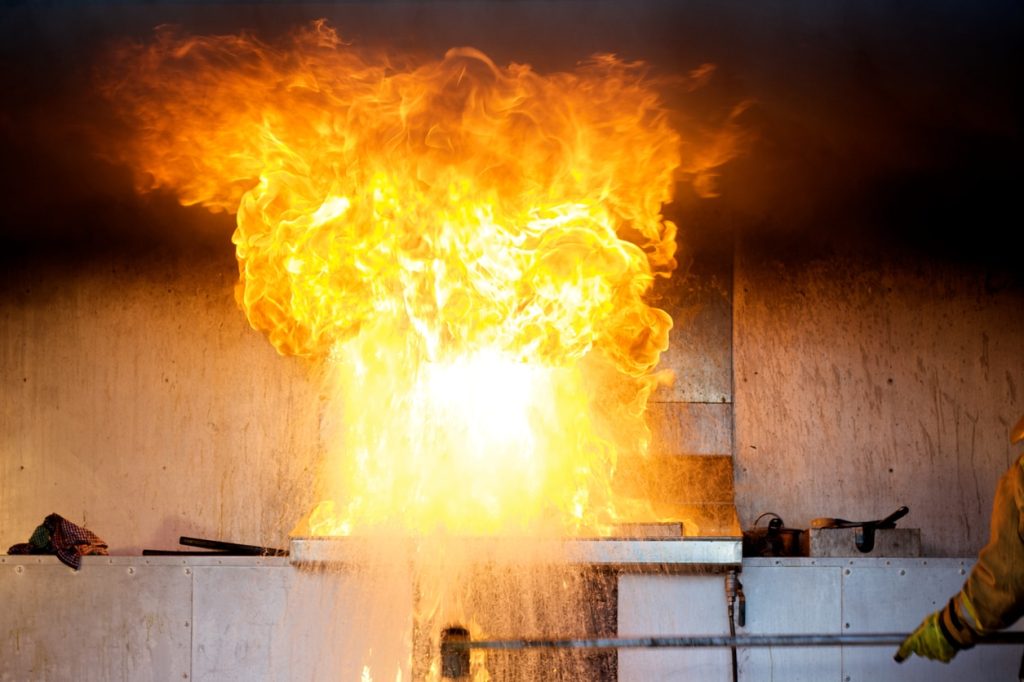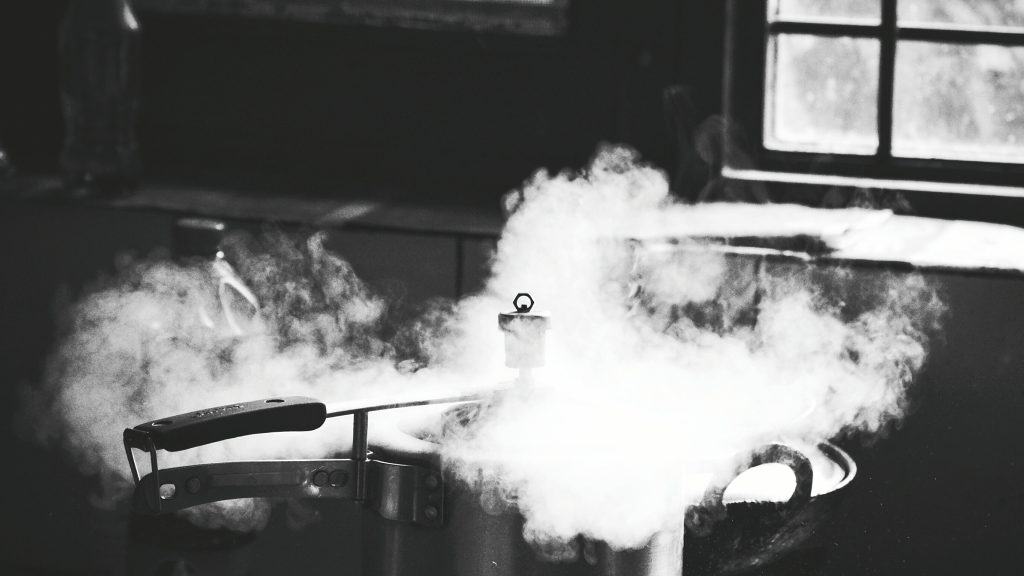Is It Normal For A Pressure Cooker To Make Noise?

I adore my Instant-Pot, which is the most well-known pressure cooker brand. However, with all of the sputtering, clicking, and steam that comes out of it when I use it, I’ve wondered if pressure cookers are supposed to produce noise.
I decided to look into it, and here’s what I discovered:
Yes. Pressure cookers are known for making a lot of noise. The safety release valve, which automatically changes the pressure needed by opening and closing, can produce noise and steam. However, there’s a lot more to know about Instant Pot and pressure cooker noise, safety, and when to be concerned. Let’s take a look at what noises pressure cookers should and shouldn’t make.
Let’s get started!
When cooking, does a pressure cooker create a noise?
Yes. When cooking, pressure cookers - both stovetop and electric, create much noise. The pressure release valve on electric ones makes the most noise; however, the rim of the lid on stovetop ones can generate noise along the rim of the lid or between the pot and the burner. There are two types of pressure cookers: stovetop pressure cookers and electric pressure cookers like the Instant-Pot. Electric machines are often safer, less prone to operator error, and easier to use.
Add your ingredients, close the lid tightly, and press a few buttons while you wait.
By contrast, stovetop pressure cookers rely on you to correctly set the burner’s heat level, and they also count on you to know when it’s time to turn the heat off (or reduce it). However, questions about the safety of pressure cookers are nothing new. They heard many stories about explosions and food on the ceiling when their grandma was a kid.
In a pressure cooker, what generates the sound?

Your pressure cooker will have a safety release valve on both the stovetop and the electric version. During the cooking process, this valve creates a lot of noise.
A pressure release valve works by automatically opening and venting part of the pressure in your pressure cooker when the internal pressure rises too high. Most of the time, this is merely steam of heated water shooting straight up.
However, there is another method in which stovetop pressure cookers can create noise.
The pressure cooker can start to create a boiling sound because it is sitting on a burner that provides the heat source, similar to a pot of boiling water on your stove. If the pressure builds up to a dangerous level, and primarily if your stovetop pressure cooker is constructed of some thin material like aluminum, it may start to tremble.
The other, more dangerous, reason a pressure cooker of any kind can create noise is if the lid isn’t fully seated or if the silicone ring inside the lid is worn and no more executes functions correctly. If steam appears to be coming from the edge of the lid rather than the release valve, open the release valve immediately, unplug the device, and move away in case the lid explodes.
However, unlike our grandmother’s pressure cookers, modern pressure cookers do not explode. But we’ll go over that in greater detail later.
Are pressure cookers prone to exploding?

Modern pressure cookers will not explode if used appropriately. To prevent explosions and assure safety, most brands contain ten or more built-in safety mechanisms. The majority of explosion stories involve stovetop pressure cookers and human error.
So, in a nutshell, the answer is maybe. However, this is unlikely.
Like the Instant Pot, modern pressure cookers offer a plethora of built-in safety safeguards to avoid disasters like your soup exploding through the ceiling.
Indeed, the Instant Pot, the most popular pressure cooker on the market today, offers ten different safety features:
- Close detection of the lid
- Detection of a leaking lid
- When under pressure, the lid automatically locks
- A shield to keep food from becoming stuck in the vent
- Temperature control on the fly
- High-temperature alert
- If the temperature rises too high, the device will automatically disconnect
- Controlling the pressure automatically
- Release of the pressure regulator
If the release valve does not work, there will be an excessive pressure drop.
Explosions were considerably more prevalent when the old-school pressure cooker was brewing on the burner in our grandmother’s day.
Do pressure cookers make a lot of noise?

No, pressure cookers don’t make much noise. The steam whistle is a touch loud when the pressure release valve opens or when you conduct a rapid release on an Instant Pot at the end of cooking. However, it is much quieter than a coffee grinder, blender, or food processor.
So, in a nutshell, the answer is no. Except for when steam is released from the release valve, the Instant Pot does not move, bounce around, or make any noise.
Even if your pressure cooker does not release steam during cooking, it will when you are finished. When you’re done cooking, there are two ways to release the pressure, one of which produces a lot more noise than the other.
Here’s a breakdown of the two types of release and why you would choose one over the other
IMMEDIATE RELEASE
Why – to avoid overcooking the meal, rapidly stop the cooking process. This should not be done with meals that splutter, such as soups. This only takes a few minutes, but it will release all of the pressure and steam inside the pressure cooker in a noisy (but rapid) manner.
Turn the pressure release valve to the left or right from the center.
RELEASE IN THE Natural way
What is the reason for this? The pressure inside your pressure cooker is gradually (and quietly) released in this manner. This is the way to go if you’re not in a rush or are cooking something delicate.
How do you do it? You choose to ignore it, and the pressure gradually decreases until it reaches neutral. When the float valve slides down, you know it’s done. It takes roughly 30 minutes to finish this task.
What causes my pressure cooker to whistle, make noise, or release steam?
When a pressure cooker detects that the pressure inside is too high, it makes a noise, whistles, and releases steam. As a result, the pressure release valve automatically opens to ensure both safety and proper pressure for the food you’re preparing.
When internal tensions become too high, this is a common occurrence.
Most pressure cookers, particularly newer electric pressure cookers, contain numerous safety mechanisms that automatically control the pressure by releasing it when it rises to dangerous levels.
The pressure in the cooker is released in the form of steam, which escapes through the safety release valve. The faster the steam travels and the more it whistles and makes noise, the higher the pressure when the valve is opened.
Consider it this way: If you put a tight cover on top of a pot of boiling water on the stove, it will ultimately boil. The lid begins to rattle and bounce around when the water in the pot begins to boil.
This is due to the pressure created inside the pot by the steam generated by the heat. However, unlike a stovetop pot, the lid of your pressure cooker is completely locked down, preventing any pressure from escaping. That’s how it can prepare meals in such a short amount of time.
Like the pot on the fire, the faster the water boils, the production of more pressure and steam takes place. And, for your protection, the pressure cooker will automatically activate the safety release valve if the pressure becomes too high.
This releases the steam and pressure gradually yet swiftly, resulting in noisy, whistling steam shooting up through the valve.
Have I answered all of your questions on whether pressure cookers should make noise?
We looked at whether or not pressure cookers are supposed to generate noise in this post. While cooking, pressure cookers and Instant Pots generate some noise, and they can also expel steam occasionally. When you don’t know what to expect, those things can be alarming.
As a result, we went over everything there is to know about whether or not pressure cookers should make noise. And understanding what noises to be cautious about and on the watch for, was part of it.











